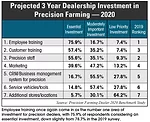Precision Farming Dealer

View Archived Issues
Summer 2020
Volume: 8
Edition: 2
Dealer Forecast: Dip in Precision Revenue
-
Table of Contents
Table of Contents
2020 BENCHMARK STUDYPrecision Revenue Growth Slows as Dealers Navigate an Evolving Market
For the first time in 5 years, dealers did not exceed higher-end growth projections in 2019, and forecast more conservative growth in 2020.Read More2020 BENCHMARK STUDYPrecision Outlook: Dealers Shift Focus to Application Hardware, Maintain Need for Training
Training for staff and customers as well as application technology hardware came in as dealers’ top priorities for the future of their businessesRead MoreCombining Practical Precision Payback with Agronomic Value
It takes time and focus to get full dealership buy-in and build out the economic benefits of adding agronomic services.Read MoreSetting Certification Standards for Precision Dealer Training
While program structures and educational expectations differ, manufacturers are placing a premium on continuing precision education.Read MorePrecision RoundtablePeer-to-Peer Problem Solving Puts Precision Managers on Progressive Path
A geographically diverse group of John Deere dealers share product info, service strategies and engage in ‘group therapy’ through virtual collaboration.Read MoreWhat Farmers Want From YouApplying Small Sample Trials to Big Picture Precision Planning
Leveraging test plots, zone sampling and fertilizer experiments, Megan and Eric Wallendal have dialed into precision farming payback at Alsum Farms in Grand Marsh, Wis.Read More10 Tips for Navigating Your Precision Business Through Unexpected Change
From managing cashflow to overcommunicating with employees, Arlin Sorensen, founder of HTS Ag, offers some advice to bolster your precision business in chaotic times.Read More -
Featured Articles
Featured Articles
2020 BENCHMARK STUDYPrecision Revenue Growth Slows as Dealers Navigate an Evolving Market
For the first time in 5 years, dealers did not exceed higher-end growth projections in 2019, and forecast more conservative growth in 2020.Read More2020 BENCHMARK STUDYPrecision Outlook: Dealers Shift Focus to Application Hardware, Maintain Need for Training
Training for staff and customers as well as application technology hardware came in as dealers’ top priorities for the future of their businessesRead More -
Digital Edition
Digital Edition











![[Technology Corner] A Big Step Forward for Interoperability & Data Sharing](https://www.precisionfarmingdealer.com/ext/resources/2025/12/12/A-Big-Step-Forward-for-Interoperability--Data-Sharing.webp?height=290&t=1765565632&width=400)


